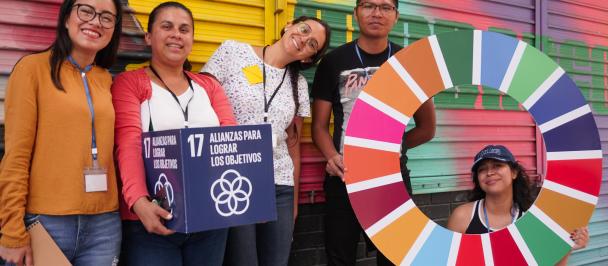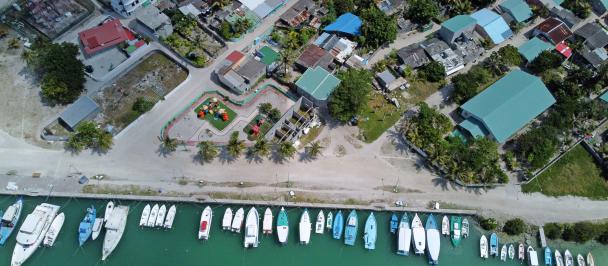A new vision for prosperity
Unlocking human development through climate action
May 27, 2025

UNDP’s NDC x SDG Insights Report offers a practical framework to help governments and partners pinpoint where development and climate agendas align and where gaps exist.
No nation has successfully achieved human development while remaining within planetary boundaries. Growing trade barriers, persistent reductions in foreign aid, and ongoing debt and financial tightening are rapidly constricting development opportunities. These shifting dynamics risk inflicting severe hardships on millions of vulnerable people.
In 2025, countries will submit their third round of Nationally Determined Contributions (NDC 3.0) ahead of the Paris Agreement’s 10th anniversary, which will be commemorated at the UN Climate Conference (COP30) in Brazil this November. It's a chance to redefine prosperity itself. Countries today face an unprecedented opportunity to align climate action with their broader growth and development agendas. UNDP is proud to support governments in seizing this moment to design integrated, forward-looking strategies that drive inclusive, sustainable progress."
In 2023, UNDP collaborated with 100 countries to systematically analyze national policy documents to identify policy priorities, chart their interlinkages and point to policy combinations that can accelerate a country’s progress towards achieving the 2030 Agenda. These Integrated SDG Insights reports also revealed a striking disconnect: Only 12 percent of participating countries identified planetary goals as an entry point for SDG Acceleration.
This realization prompted a fundamental question. Knowing that climate action and human development are deeply intertwined, why do so many governments not recognize the potential?
UNDP’s NDC x SDG Insights offers a practical framework to help governments, partners, and stakeholders pinpoint where national development and climate agendas align, where gaps exist, and which integrated policy actions can accelerate progress on both fronts.
This new initiative leverages sophisticated analytical models to identify context-specific SDG accelerators within NDCs. This approach is reshaping how nations view their development plans, not as a choice between prosperity and sustainability, but as a pathway for both.

From insights to impact
UNDP piloted the Integrated NDC x SDG Insights initiative in El Salvador, Uzbekistan, Cambodia, Liberia, and Tunisia to bridge the gap between national climate commitments and development. At the heart of this effort was a guiding question: What are countries’ key climate and development priorities and how can their interlinkages shape both the NDC 3.0 process and power development breakthroughs?
By gaining a deeper understanding of each country’s specific priorities within the context of the SDGs and climate action, UNDP used these insights as strategic entry points to guide NDC 3.0 strategies, advancing climate goals while supporting broader economic and social transformation.
- In El Salvador the NDC x SDG report emphasizes the opportunity for strategic investments in agriculture, ecosystem restoration, waste management, and climate-resilient infrastructure that would accelerate the country’s goal to make cities and human settlements inclusive, safe, resilient, and sustainable. This is a key accelerator for The National Comprehensive Development Strategy 2023 to promote the economic, social and cultural transformation of El Salvador, through accelerated, resilient and inclusive growth.
- For Uzbekistan to achieve the ambition to become an upper middle-income country by 2030 the report shows that the government should increase its NDC 3.0 ambition further reducing energy costs for businesses and households while increasing participation of public scientific institutions, women and local communities in planning and management.
- In Cambodia the report reveals the opportunity for development priorities and guiding principles to be integrated in the NDC 3.0. The integration of NDC with SDGs will foster more ambitious and holistic climate targets for 2035, reflecting national development priorities.
- In Liberia NDC 3.0 is poised to be a powerful vehicle for delivering the government's ARREST Agenda for Inclusive Development. The report highlights how NDC 3.0 can support programmes for environmental governance, forest resource management and energy under the strategic policy on climate change, while contributing to Agenda 2030.
- In Tunisia the report highlights the opportunity to strengthen the alignment between its climate policies and national development strategies by strengthening institutional frameworks and policy coherence to better facilitate decision-making that promotes both climate and developmental goals.
With the success of the first five pilot countries and as nations prepare to update their NDCs this year, UNDP is scaling up its NDC x SDG Insights initiative, expanding to 15 more countries. This reflects UNDP’s commitment to helping align climate action with national development and uncover the integrated solutions needed to accelerate progress on poverty, inequality, and resilience.
The NDC x SDG methodology
The NDC x SDG Insights process is a data-driven, AI-powered approach designed to integrate national climate commitments with sustainable development priorities. Each report harnesses systems intelligence to provide a comprehensive analysis through four key components.
It begins with the NDC x SDG Moment phase, offering a high-level overview of a country's development and climate challenges. This section contextualizes key data on economic growth, environmental pressures, and societal well-being, setting the stage for a deeper analysis.
The NDC x SDG Alignment phase analyses a country’s NDC activities, custom-built machine learning to synthesize national priorities, and provides a snapshot of the relative NDC x SDG alignment.
The NDC x SDG Interlinkages phase identifies synergies between NDC activities and SDG targets to chart policy pathways with the largest expected multiplier effects.
Finally, the Finance & Stimulus component assesses fiscal and financial conditions, offering insights into economic stress indicators and potential stimulus measures.

NDC x SDG Insights provides countries with the analytical foundation to craft climate strategies that not only meet emissions targets but also drive development breakthroughs.
Aligning finance with ambition
Financing lies at the core of sustainable development. Through its Sustainable Finance Hub, UNDP supports countries in reimagining how resources are mobilized and aligned to advance inclusive, climate-resilient growth.
Central to this work are mechanisms like the Integrated National Financing Frameworks (INFFs), a transformative approach enabling governments to strategically align public and private financing with national development goals. By leveraging INFFs, countries are increasingly able to craft ambitious, context-specific financing architectures that drive systemic impact and deliver measurable results for people and planet. INFFs provide a comprehensive lens to assess financing needs, identify gaps, and design forward-looking strategies that integrate climate action, economic recovery, and social progress.
Shaping the future we need
Collaboration has been critical in aligning climate action with human development. In partnership with the Pardee Institute for International Futures, UNDP harnessed the International Futures model to produce the SDG Push x NDC 3.0 Report—a groundbreaking analysis that challenges outdated thinking by demonstrating how climate action and human prosperity can reinforce and accelerate one another. The findings illustrate a compelling scenario. Aligning bold climate action with the SDGs could lift an additional 60 million people out of poverty by 2030.
UNDP is also collaborating with the Organization for Economic Cooperation and Development to make the case that ambitious, investable and implementable NDCs, in line with the Paris Agreement’s goals, can lead to sustainable development and growth, jobs and well-being.

 Locations
Locations


